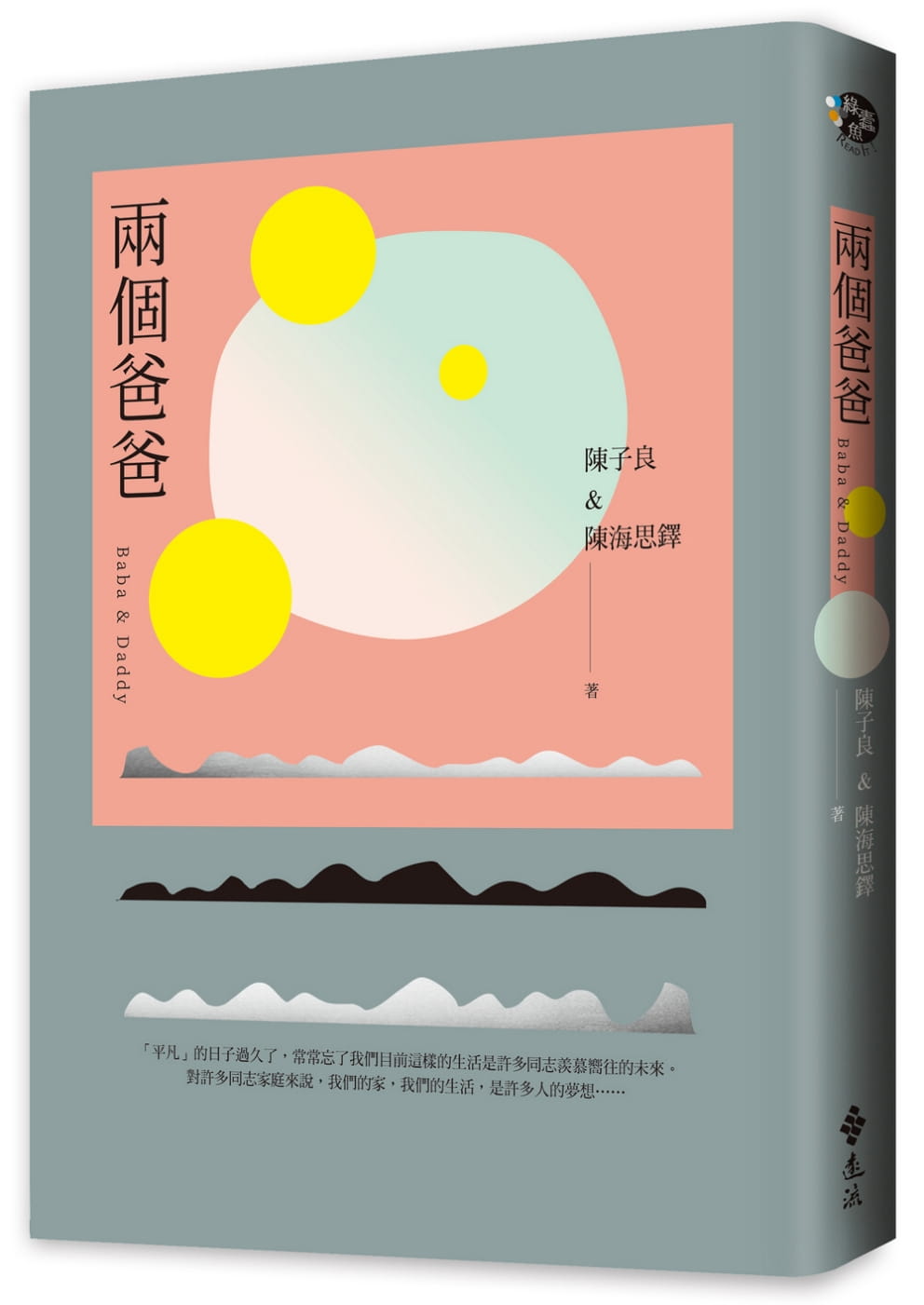by Brian Hioe
語言:
English
Photo Credit: Book Cover
New Bloom/No Man is an Island editor Brian Hioe interviewed Lance and Stuart Chen-Hayes, who recently published 兩個爸爸. This follows up on an interview conducted following the publication of Double Dads One Teen in English in 2019. Lance is Taiwan’s first out gay dad and their nonbinary teen, Kalani, became the first Taiwanese citizen with two father’s names on both an international birth certificate and an international marriage license.
Brian Hioe: Could you first introduce yourself for readers that don’t know you?
Lance Chen-Hayes: I’m Lance Chen-Hayes. I’m a retired physical therapist and for the past three years, I’ve volunteered with API Rainbow Parents of PFLAG NYC. The main focus of my activism is helping parents with LGBTQ children.
Recently, I wrote a family memoir in Mandarin with Stuart as coauthor; a lot of material is from his 2019 Dio Press Inc book, Double Dads One Teen. The Mandarin book is called 兩個爸爸 and I added significant material from my experience as Taiwan’s first out gay dad.
Stuart Chen-Hayes: I am professor of Counselor Education, School Counseling, and soon to include Clinical Mental Health Counseling at the City University of New York’s Lehman College in the Bronx. I start my 24th year in September, which is my 29th year as a professor. My scholarship has focused on sexuality counseling, queer and trans youth, and school counseling. I teach the United States’ only sexuality counseling course focused on school counselors.
I’ve written three books. This is my third, coauthored. The second was the English version of the book, Double Dads One Teen: The Trailblazing Life of a Queer Family in the USA and Taiwan, which is about the story of creating our family both in Taiwan and the USA, as well as the activism that we’ve done. The first book that I wrote was 101 Solutions for School Counselors and Leaders in Challenging Times, focused on activist school counseling.
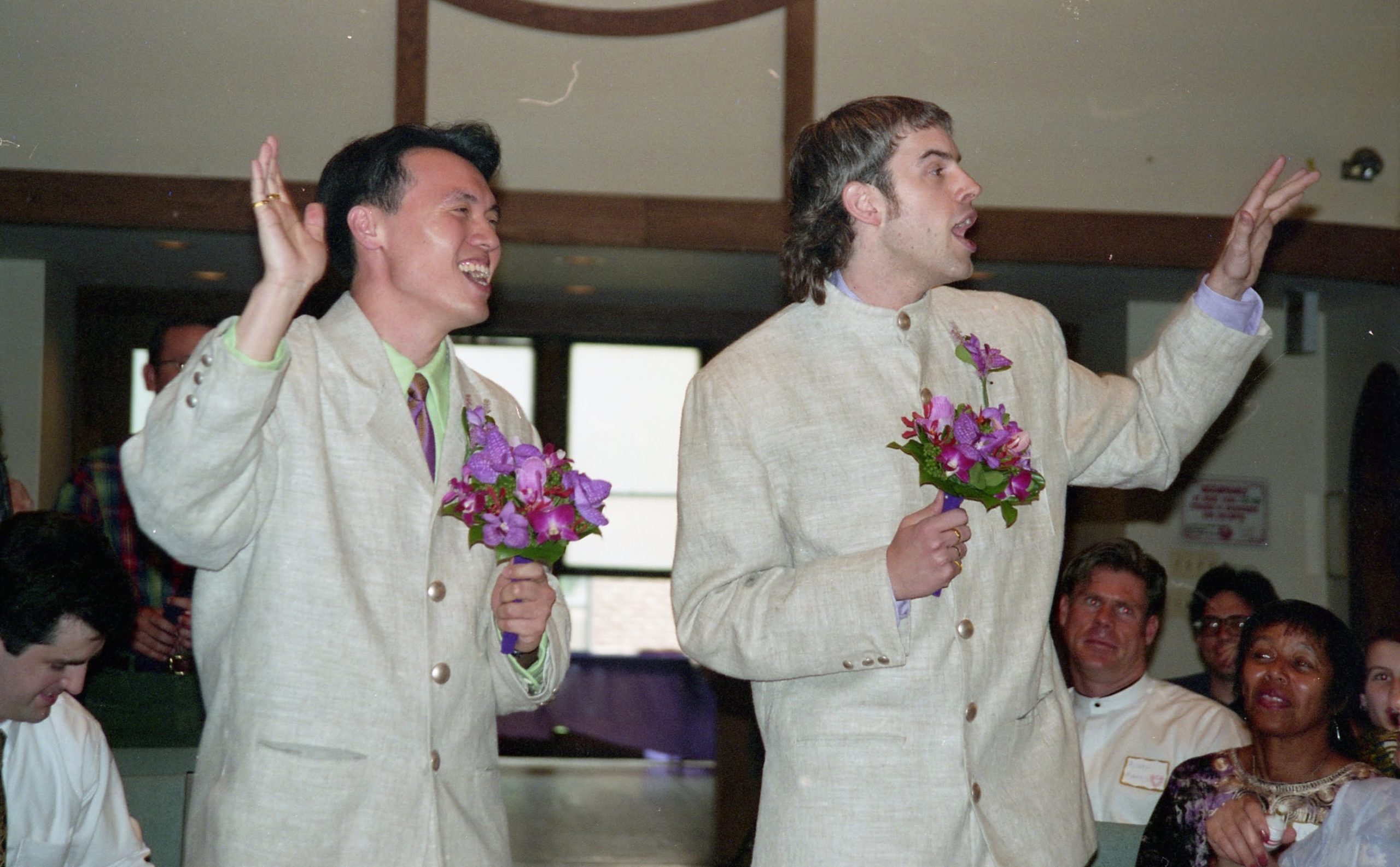
Photo courtesy of the authors
BH: Could you talk a bit about your book. For example, why did you write it and what were you hoping to do in writing it?
SCH: The book came about 12 years ago. We were on sabbatical at National Changhua University of Education and at that time the Dean of the School of Education was Dr. Shu-chu Sharon Chao. She had written a National Science Foundation Council grant to bring us in to teach. We believe we are still the only gay couple to have ever taught a graduate course anywhere in Asia, let alone in Taiwan, together. So we taught the Master’s counseling Gender and Sexuality course together bilingually. I taught the same course to the doctoral students alone in 2007.
She had said, “Wow, you know, your story is really neat. You should write a book.” So I did. It took a long time to get it published. And I finally found a small publisher in the USA that was willing to publish it inn 2019. We had sought a publisher in Taiwan as well. Two gay men who run a small academic press had said they were really interested in it and they wanted it, but they were interested in shopping it to a commercial publisher in Taiwan and that’s how the Mandarin version came to be published by Yuan Liou press this year.
LCH: For the Mandarin version, I initially translated the English version. And then we got to know this small publisher, Professor Bih from National Taiwan University, who is the brother of my former co-worker and whom I had known for several years prior, and he had , read the original document in English and the Mandarin translation transcript.
He and his partner felt that there was a translation barrier. It’s hard to draw Mandarin readers into the story of a translated text. Because the English version is written from Stuart’s point of view, they suggested that I rewrite the whole book from my point of view. As I rewrote it, I added a lot of my own reflections and my own stories growing up in Taiwan.
I try to draw people into my story as Taiwan’s first out gay dad and our stories together as a couple and family, and how we raised a child (now almost 18) together. I feel that all the stories weave different issues together. After I rewrote the book and Professor Bih read it, he felt that we should go to a commercial publisher. He has editor friends at the publisher, so he brought the transcript over to Yuan Liou. They read it and they were interested in publishing it in light of Taiwan’s passing gay marriage and the interest in queer families.
That’s how it got published. The whole process took a little over a year; last year they were planning on publishing it, but then the pandemic hit. Some stuff got cancelled, and then we were not able to travel back to Taiwan until this Spring/Summer.
We were thinking everything would be fine—that we could do public book events and everything as planned. However, the second or third day after our arrival, Taiwan had a big outbreak of COVID-19. So some book events were canceled and other events moved online.
BH: What were you hoping to do in writing the book? What were the two of you hoping the effect would be from both the English version and the new Mandarin version?
SCH: The idea was for both versions to get the stories out to the public in both languages. There are so few—almost no stories—of mixed-race gay couples with children anywhere in the world, anywhere in the literature. Then with Taiwan being first in Asia with gay marriage, we felt that it was a really significant milestone. We did a lot of advocacy, both in the US and in Taiwan, to support our child’s journey legally and in varied school settings.. There was a lot more work prior to gay marriage due to the lack of legal protections and we were often the only gay dads in schools that Kalani attended.
And, Lance is Taiwan’s first out gay dad. He wrote in the new book that our lives were pioneering the normal.
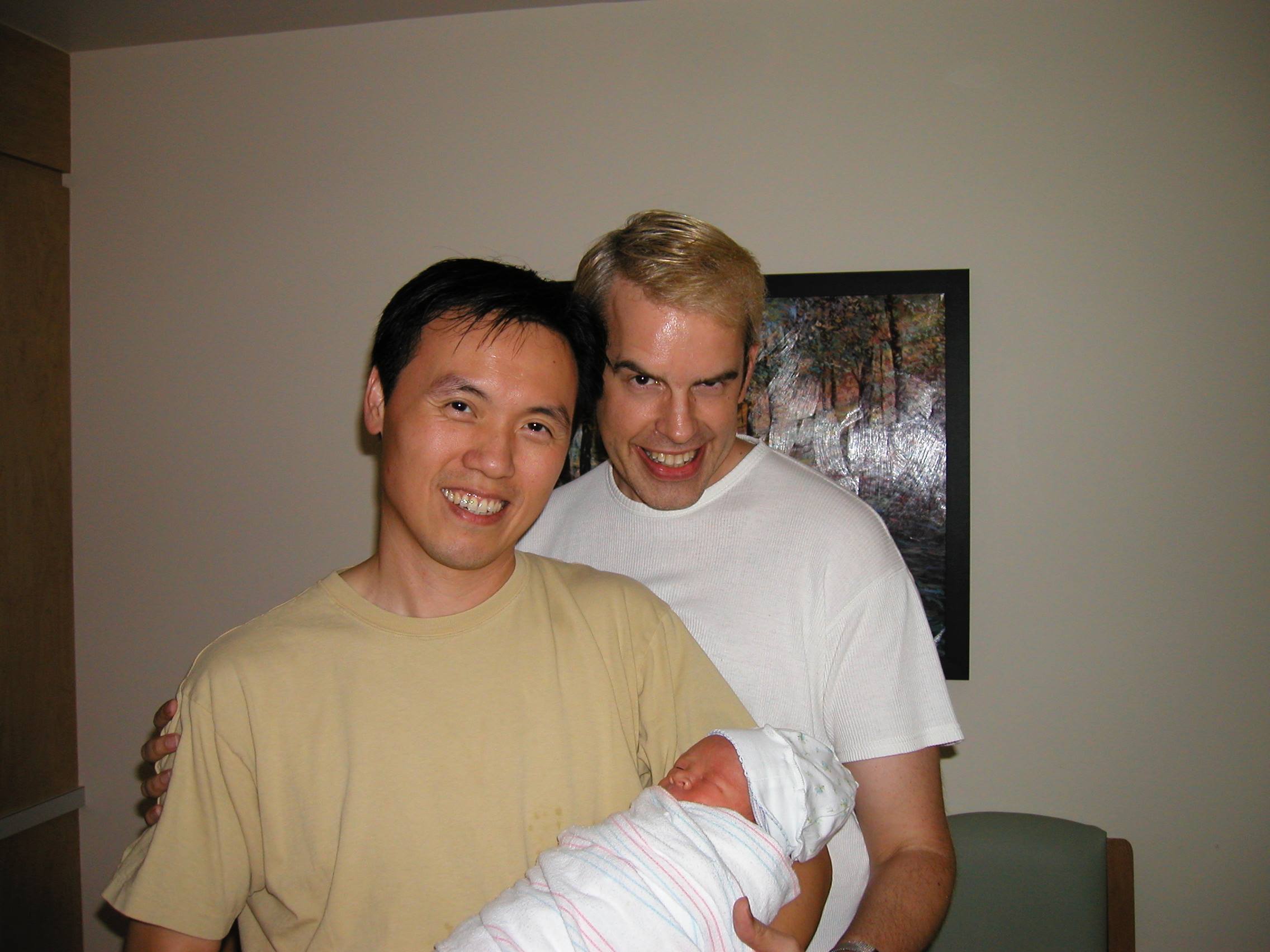
Photo courtesy of the authors
LCH: Pioneering in ordinary life. Being an ordinary pioneer. We have led our lives thinking that we’re doing the best we can as gay dads, with intentionality to navigate our lives for 27 years. But throughout all the daily events we were pioneering in a lot of different aspects.
As gay parents, in all the environments we encountered, many people did not have experience with gay parents or gay families. As Kalani grew and became very clear about who they are as a person, we started to advocate for LGBTQ youth as well.
We were pioneers in navigating different systems and advocating for different issues. When I wrote the Mandarin version, I was thinking about how I’ve led my life in a lot of intersectional ways as a gay Asian immigrantsin the United States.
I talked about my childhood trauma. I talked about my relationship trauma before dating Stuart, other intersectional issues, and I tried to weave that together to broaden and deepen how people understand the complexities that , as a gay couple, a gay family, we deal with a lot of different issues all at once.
The most interesting thing is how I challenge when people say, “Oh, well, when we get to know gay couples, they’re just like other families.” When I hear that, I always say we look like other families, but in reality, we are not the same at all because we have to deal with heteronormative society. We have to deal with microaggressions and a lot of different issues that straight couples don’t encounter. It’s exhausting.
BH: I’m very curious about the reception of the two versions. Have there been any differences in how reactions to the English and the Mandarin has been?
LCH: So far, in Taiwan, even before the book was published, the publisher was able to find a lot of reviewers. Many reviewers are my friends. The way they talked about the book helped me understand that the impact of this book is tremendous and ground-breaking.
The feedback from people who have read the book shows this book is important—not only for LGBTQ people in Taiwan, but for other people who want to know about LGBTQ issues such as education for children and adolescents. People can learn from how we implemented our philosophy of education for Kalani. Some people also talked about how the book spanned two different centuries and two different generations of LGBTQ issues. It covers the LGBTQ movement from before the martial law was lifted in Taiwan to post-martial law today in Taiwan and reflects what happened in the US. All the feedback has been very positive and encouraging.
BH: What events have you done to promote the book? The original plans to promote it were, of course, disrupted by the recent COVID outbreak.
LCH: Right. Because we haven’t been able to do in-person book events—we’ve done several online presentations in three different universities for audiences of 120-200 persons each in Taipei, Changhua, and Pingtung, as well as a podcast with a group of gay dads.
SCH: The National Taipei University of Education presentation actually had 600 people scheduled for their online event.
LCH: When they decided to move the presentation online, they figured they would be able to accommodate more people. They opened up the registration and they had 600 people who registered for the online events, but the platform could only accommodate 200.
SCH: Whenever we come to Taiwan, we always try to do something with counseling graduate programs. Usually, it’s been at National Changhua University of Education, and we always try to do something at National Pingtung University of Education, because a professor of counseling there, Wang Ta-Wei was the doctoral student at National Changhua University of Education who initially reached out to me for our first presentation at a university here. in 2005. We originally declined because we were on vacation, but eventually agreed, and that was how we met.
We always try to do queer and anti-oppression workshops when we are in to Taiwan—whether focused on the story of our family or this time queer couple counseling in addition. And for years we were the only out gay couple with a child that most students had ever met in Taiwan.
So I think the use of trailblazing in the English version’s subtitle is true because we kept living our lives and realized as we shared the presentations over the years that they were making a big impact and inspiring others to create queer families in Taiwan. The feedback was consistent with people telling us it was lifechanging and inspiring for them to hear our story and meet us in person.
We’re close to a number of Taiwan queer couples who were childless when we first met and now have kids.
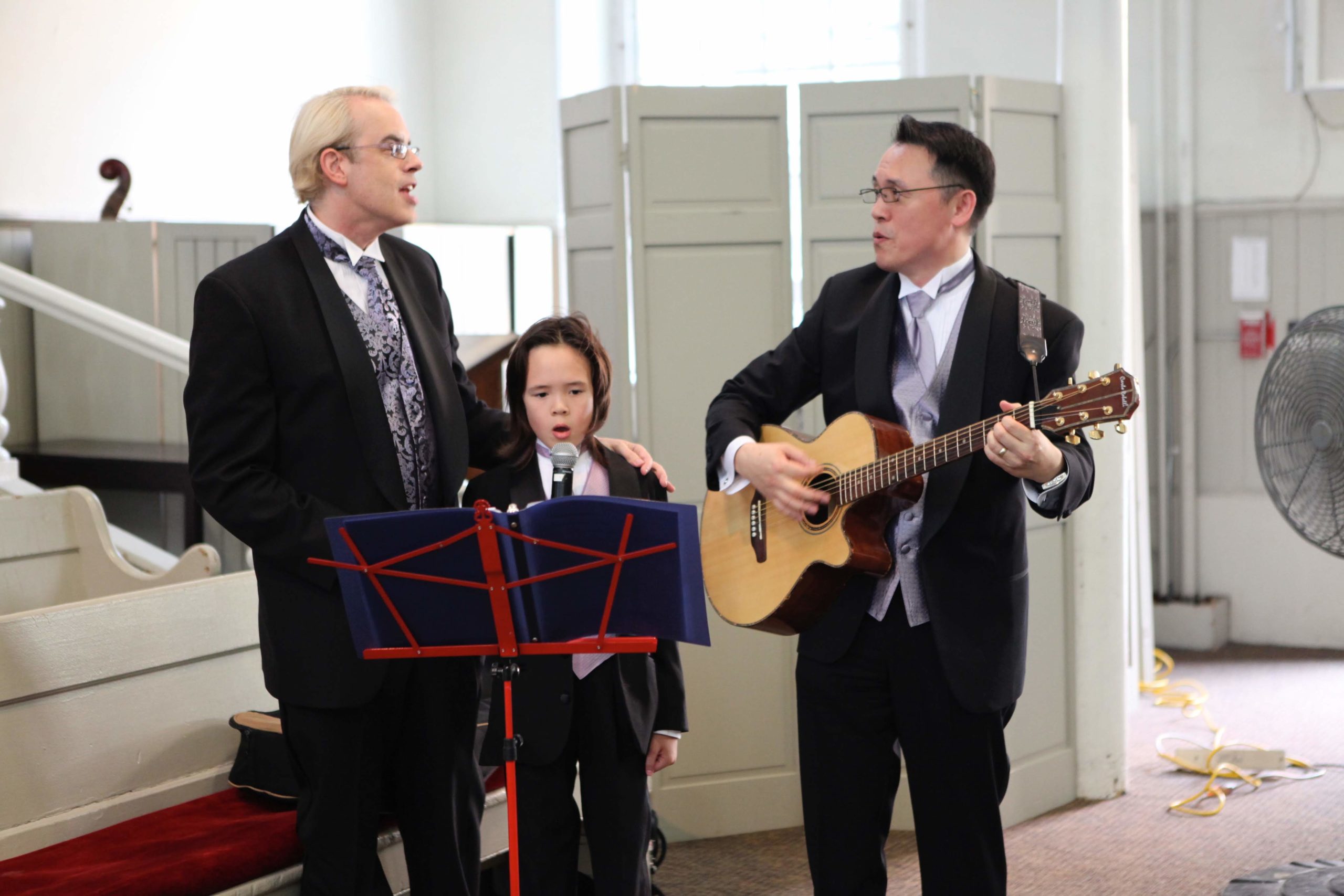
Photo courtesy of the authors
LCH: Several of them have told us that our story inspired them to have kids. They felt that yes, I can become a parent, too. And that was pretty amazing to hear.
SCH: We’d like to think that we’ve changed the world on two continents—at least a little bit.
BH: What is planned next for promoting the Mandarin book?
LCH: I’ve suggested to the publisher that they should do some book events online, but they have no experience with online events, so they’re still trying to work it out. Without the publisher’s help, I’ve been doing a lot of other events on my own because I have a network through the LGBTQ Family Rights Association, the Marriage Equality Coalition (now Taiwan Equality Campaign), and the Taiwan Tongzhi Hotline as well. There are several more events planned this summer.
I always feel kind of odd talking about promotion for the book, because for me it’s about sharing the stories—about telling the stories to help people. I really hope more people can hear about our stories.
BH: It’s interesting too, because the English version came out first, around the time of the marriage equality ruling. Now it’s been legalized for two years in Taiwan.
SCH: Right. A couple told us recently that we had set a precedent because Kalani became the first Taiwanese citizen who received citizenship through having both dads’ names on an international birth certificate and an international marriage license. So when they went to apply for their child, we were the legal precedent that had already occurred paving the way for others to do so.
BH: In that respect, the book is also about a mixed-race couple. Could you talk a bit about that?
LCH: We are very conscious about not portraying White people as superior just because they’re often able to be out. And we work to fight the stereotype that being fmixed-ace is perceived as better. White supremacy is an issue not just in the United States, but in Taiwan and Taiwanese culture. I talk about it in the Mandarin book. We raised Kalani to embrace their own multicultural identity without favoring one ethnic or racial identity over another, and to be aware of White privilege.
That’s also because I had the privilege to be out so early on as a gay Taiwanese man. I have been out to my family and open for twenty-some years. So to me, that’s a privilege that allows me to speak openly. That’s how I became the first out gay dad in Taiwan. To me, the privilege also means that I have the social responsibility to talk even louder, share more, and to bring my stories to people across Taiwan.
BH: It’s also quite salient because transnational gay marriage, as well as adoption rights, are still an issue in Taiwan because of the current laws.
LCH: I discuss that in the Mandarin book. Even though gay marriage was legalized in Taiwan, there are many areas that are still not protected or included—adoption of nonbiological children as well as marriage limits to only couples who are from a country that allows gay marriage (currently).
I also discuss how gay marriage is not the end goal for the LGBTQ community. There are so many other issues about equal rights protection. I know there’s some work now about legal rights protection law, but we really need to get it through the Taiwan legislature. Because housing, employment, consumer rights, a lot of issues are still not covered for LGBTQ Taiwanese.
Another issue is about families in Taiwan, because many families—especially parents—they feel, oh, it’s okay if other people’s children are gay. But when it happens to their family, they often react or respond very poorly. How do we educate them to really feel that they can embrace it in a way that’s really intimate to their own family? We need to make that cultural shift as well. It’s a lot of work.
SCH: There’s a huge difference between the U S and Taiwan in terms of how there are a large number of single dads who are here, because surrogacy is not legal in Taiwan. Whereas it is in the US. A big part of the English book is discussing the gift that my sister gave and how unique that was even within surrogacy circles.
Yet we would have had difficulty if we were both in Taiwan in terms of the surrogacy issue because of how restrictive the law is. We were lucky that we were in the US where that was not an issue. But the cost factor, we’ve talked a lot about economics—that you don’t see poor and working class queer folks in Taiwan. The folks you see are the folks who are professionals, who have a lot of money, who have the resources to go out of the country and do surrogacy because it is so expensive. That’s true in the US as well.
The other issue is that both the US and Taiwan both have histories of colonial invasion and issues of internalized racism, including attacks on indigenous people and stealing land and resources and labor. Yet the U S has had this resurgence of overt racism and it has been incredibly damaging to people of color. So the climate has become one that is much more hateful, and one that is much more overtly racist, and much more challenging to all people of color—to mixed-race people and to mixed- race families, too. I think it’s increased trauma. I think it’s increased a lot of pain.
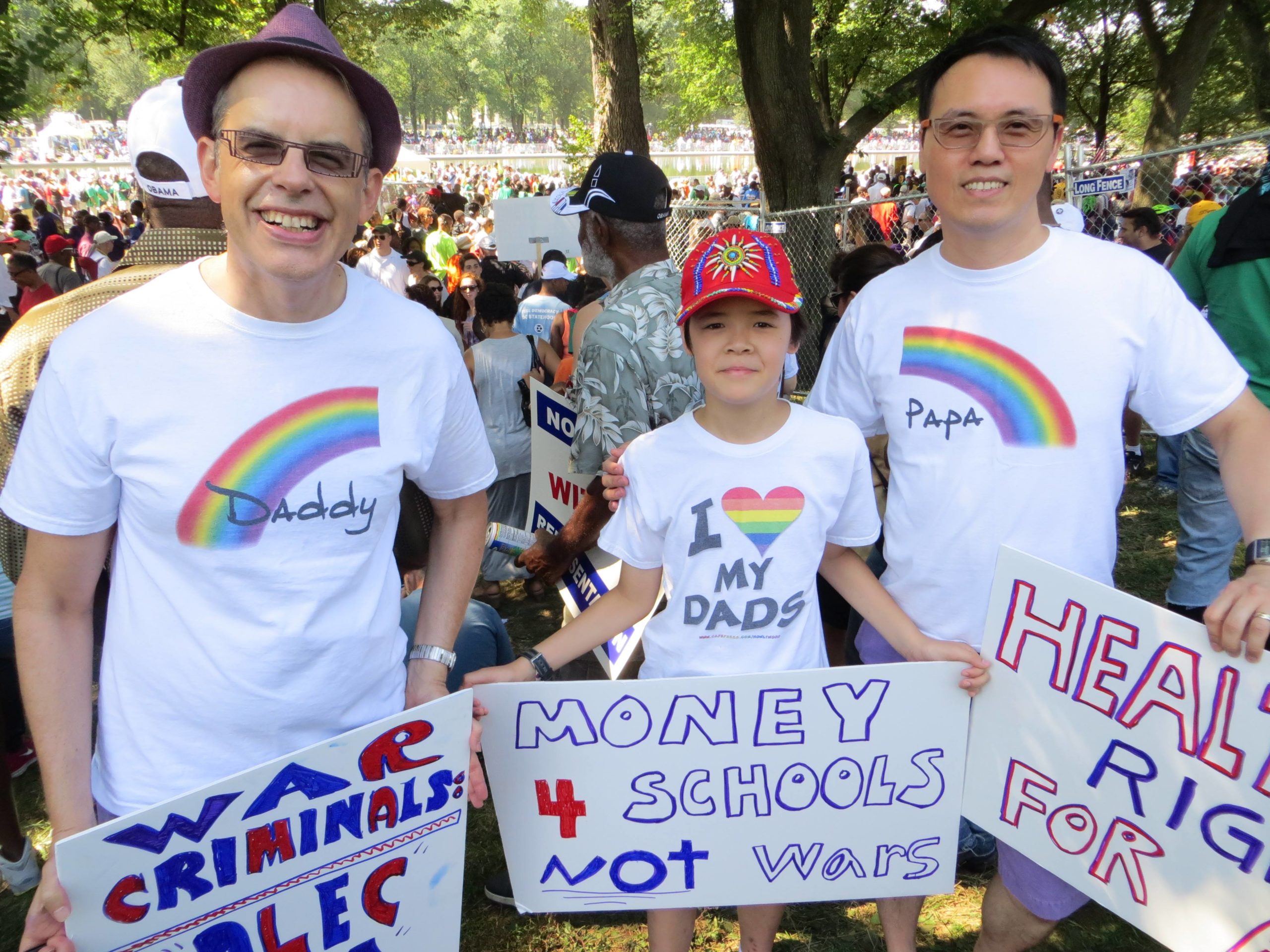
Photo courtesy of the authors
BH: Is there anything else that you think should be brought up or closing words to readers holidays or otherwise, or international?
SCH: Both books are for everyone—not only for gay people or mixed race folks. There is so much that really speaks to a couple’s journey, a family’s journey, and the parenting journey.
But at the same time we have a real uniqueness as gay dads with a queer teen and professional and personal stories to share with the public and with professional counselors to assist LGBTQ couples and families.. Some of the workshops that I did this year in Taiwan included was teaching counselors and graduate students about queer couple counseling and the work of Dr. John and Julie Gottman, who aren the only evidence-based researchers who’ve done significant work with gay and lesbian couples recently. They talk about conflict and about how couples who are successful in mediating conflict are the ones who have successful relationships.
Some of their research has shown the unique, special things that gay and lesbian couples have that straight couples don’t. Queer couples, for example, tend to be less coercive when we have conflict, we tend to use humor better. And so I think that’s really the piece that folks need to look at—not only the uniqueness, but the strengths queer couples have that straight couples can learn from.
LCH: I think for the media or the public, a lot of times we want to elevate “successful” stories. Because it’s as if because a gay family is successful, we should tell their stories to help people understand, “Yeah, gay people are also good people.” LGBTQ lives are so complex. Not everybody is successful in every way or everywhere. It’s really important to talk about multiple issues and to be aware that LGBTQ people are just as rich in our lives and yet there are so many complexities.
Another workshop I’m doing here in Taiwan is with a friend who’s also a therapist. He specializes in narrative therapy. So we’re going to talk about trauma and healing for LGBTQ people. That’s an issue that’s not really been raised enough in Taiwan, especially for counselors or psychologists to be aware of. In fact, most LGBTQ folks have experienced trauma and how to help us is a very important issue as well. And that’s my attempt to add to the complexity of addressing LGBTQ issues. We need to look at them in a complex way to meet multiple needs. That’s my hope with the book, that I can help people to see and honor that complexity.
BH: Thank you.


